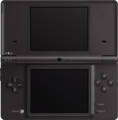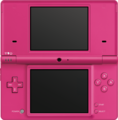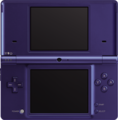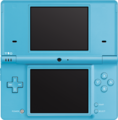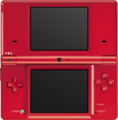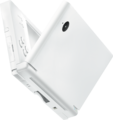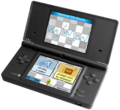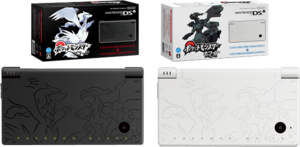Nintendo DSi: Difference between revisions
Powerrangers (talk | contribs) mNo edit summary |
m (→Changes from Nintendo DS Lite: Grammar Edit) |
||
| Line 32: | Line 32: | ||
* 12% thinner than DS Lite | * 12% thinner than DS Lite | ||
* Screens are 3.25 inches, an increase of .25 from DS Lite | * Screens are 3.25 inches, an increase of .25 from DS Lite | ||
* Two 0.3-megapixel | * Two 0.3-megapixel cameras inside and on the back of the system with a maximum resolution of 640x480 | ||
* Doubled main CPU clock rate (133 MHz in comparison to 67 MHz of the previous systems) | * Doubled main CPU clock rate (133 MHz in comparison to 67 MHz of the previous systems) | ||
* Four times as much RAM (16 MB in comparison to 4 MB of the previous systems) | * Four times as much RAM (16 MB in comparison to 4 MB of the previous systems) | ||
Revision as of 12:49, 12 April 2015
ニンテンドーDSi Nintendo DSi | ||||||||||||||||
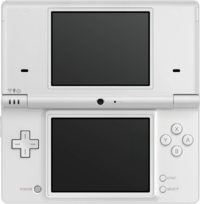 Nintendo DSi | ||||||||||||||||
Release dates
| ||||||||||||||||
Technical specs
| ||||||||||||||||
Related information
| ||||||||||||||||
External links
|
The Nintendo DSi (Japanese: ニンテンドーDSi Nintendo DSi) is the second redesign of the Nintendo DS, after the DS Lite. The system was released in Japan on November 1, 2008 in the colors matte black and white. It was released in Australia on April 2, 2009, in Europe on April 3, 2009, and in the United States on April 5, 2009. Initially, the white was replaced with blue in the Americas, however currently the white as well as pink are available. An upgraded version, the Nintendo DSi XL, was announced on October 29, 2009.
Changes from Nintendo DS Lite
- 12% thinner than DS Lite
- Screens are 3.25 inches, an increase of .25 from DS Lite
- Two 0.3-megapixel cameras inside and on the back of the system with a maximum resolution of 640x480
- Doubled main CPU clock rate (133 MHz in comparison to 67 MHz of the previous systems)
- Four times as much RAM (16 MB in comparison to 4 MB of the previous systems)
- Game Boy Advance slot has been removed
- SD card slot added to transfer photos and music between DSi, Wii, PC and digital cameras
- Music playback for AAC music files
- Record sounds with the microphone
- Enhanced speakers and audio
- Nintendo DSi Shop from which DSi applications can be bought using Nintendo Points
- Free-to-download Opera Internet browser available at launch
- In later models this software, along with Flipnote Studio, is already installed
- Power button relocated to below D-Pad
- Stylus relocated to below SD card slot
- New user interface similar to that of Wii
- Integrated Photo Channel and music playback
- Applications from the Nintendo DSi Shop are region-locked
- Certain DS game-card games are region-locked on the DSi and later models, such as the Japanese versions of Pokémon Black and White
- The startup tone no longer differs on the owner's birthday
- The sound changing button has been moved to the left-hand side.
Game Boy Advance incompatibility
The biggest change, perhaps, between the previous models and the DSi is the removal of the GBA port. This causes the system to be unable to play the Generation III games as well as other Game Boy Advance games. Because of the Generation IV games' use of dual-slot mode, the incompatibility makes it impossible to capture Pokémon of previous generations, and impossible to use Pal Park for migration of Pokémon from Pokémon Ruby, Sapphire and Emerald, or FireRed and LeafGreen.
DSi-enhanced features
DSi-enhanced game cartridges are DS games that have additional features when played on the Nintendo DSi or 3DS. Black, White, Black 2, and White 2 can connect to WPA and WPA2 protected wireless networks and utilize the camera when using the Xtransceiver when played on a DSi or 3DS. However, they are also region-locked on these systems.
Pokémon games
All releases listed are the year in which the Japanese version was released.
| Title | Genre | Release |
|---|---|---|
| Pokémon Dash | Racing game | 2004 |
| Pokémon Trozei! | Puzzle game | 2005 |
| Pokémon Mystery Dungeon: Blue Rescue Team | Dungeon crawler | 2005 |
| Pokémon Ranger | Action RPG | 2006 |
| Pokémon Diamond and Pearl | Main series RPG | 2006 |
| Pokémon Mystery Dungeon: Explorers of Time and Explorers of Darkness | Dungeon crawler | 2007 |
| Pokémon Ranger: Shadows of Almia | Action RPG | 2008 |
| Pokémon Platinum | Main series RPG | 2008 |
| Pokémon Mystery Dungeon: Explorers of Sky | Dungeon crawler | 2009 |
| Pokémon HeartGold and SoulSilver | Main series RPG | 2009 |
| Pokémon Ranger: Guardian Signs | Action RPG | 2010 |
| Pokémon Black and White | Main series RPG | 2010 |
| Learn with Pokémon: Typing Adventure | Typing | 2011 |
| Pokémon Card Game: How to Play DS | Card game | 2011 |
| Pokémon Conquest | Turn-based strategy | 2012 |
| Pokémon Black 2 and White 2 | Main series RPG | 2012 |
Gallery
Special Pokémon editions
A special DSi bundle featuring Pokémon Black and White was announced by The Pokémon Company. The bundle includes a copy of either Pokémon Black or Pokémon White as well as a special DSi with Reshiram and Zekrom on it. The DSi will be colored black or white, depending on which Pokémon game is chosen. It was released in Japan on November 20, 2010. A similar bundle was also announced for Europe and was released on March 4, 2011. The bundle was also available in the United States in limited edition starting on March 6, 2011.
See also
- DSi on Nintendo's official site (Japanese)
| Game systems with Pokémon games |
|---|
| Nintendo handheld consoles |
| GB (Pocket · GBL · SGB · SGB2) • GBC • mini • GBA (SP · GBm · GBP) DS (Lite · DSi · DSi XL) • 3DS (XL · 2DS · New 3DS · New 3DS XL · New 2DS XL) Switch (Lite · OLED) |
| Nintendo home consoles |
| SNES (BS-X · SGB · NP · SGB2) • N64 (DD) • GCN (GBP) Wii (Family Edition · mini) • Wii U Switch (OLED) |
| Sega consoles |
| Pico • CoCoPad • Beena |
